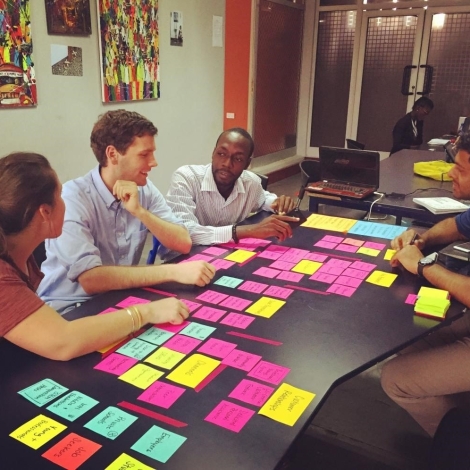By Kay Chau,
Director of Product and Customer Success at TaroWorks
Making do with less is a fact of life for social enterprises and nonprofits. For cost-conscious organizations, finding pro bono consulting help and technology grant funding may be the only way to achieve certain ICT for development goals (ICT4D).
Based on our experience at TaroWorks and additional research we’ve done, here are some suggestions for stretching your technology budget with the help of volunteers and grantmakers.
How to Bring on a Volunteer Tech Professional
It’s easy to find people in the for-profit tech community willing to donate their services to nonprofits. Picking the right person for the job and ensuring your organization and the volunteer each have something to show for the time and effort, is harder.
Before enlisting the help of a tech professional, social enterprises and nonprofits should focus on a single project for which such assistance will have the biggest impact. Maybe you want to redesign your website, roll out a customer relations management solution or set up an SMS information distribution system. Taproot Foundation, one of several organizations which supply nonprofits with pro bono services, offers these tips for engaging tech talent.
Tip: Focus on a single project for which you need assistance.
Knowing the value of a volunteer’s time to your organization can also help convince your colleagues that taking on a new team member will pay off. Taproot Foundation conducted a study in 2015, which found that the standard value of pro bono services, such as strategic planning, IT and marketing analytics is $150 an hour. In describing the results, Liz Hamburg, president and CEO of the Taproot Foundation, wrote:
“It’s one thing for a nonprofit Executive Director to report to her board that she received outstanding marketing or IT support pro bono but the benefit to the organization is amplified and becomes tangible when she can add that the value of the service was $10,000, $30,000, or upwards of $75,000. The same is true for companies or professionals interested in tracking and reporting their pro bono service.”
Our sister organization, Bankers Without Borders, which provides volunteer consulting services, realized that measuring a volunteer project’s results is as important as getting the help. With that in mind, they developed Skillanthropy™, a “management technology solution, which helps organizations streamline volunteer recruitment efforts, more efficiently manage and monitor projects, better understand their impact, and evaluate their outcomes.”
Tip: Knowing the value of a volunteer’s time to your organization can help convince your colleagues that taking on a new team member will pay off
For ICT volunteers, I’ve seen success when they are involved in clearly defined and well planned projects. In particular, efforts that don’t meet immediate needs, but have potential to help a nonprofit or social enterprise significantly if time and resources can be found to get them done.
One such project was a volunteer consulting assignment launched by TaroWorks’ parent organization Grameen Foundation. Two microfinance institutions needed to integrate Grameen Foundation’s technology with an accounting system they hoped to purchase and wanted help mapping out their business processes and choosing the right accounting software.
Tip: A trip outside their country can give volunteers an enriching exposure to a different business and social culture.
For eight weeks, volunteer professionals from Accenture and Dow Chemical dedicated their time and expertise to the project, traveling to India and Tunisia to scope out requirements, understand the organization’s needs and deliver recommendations and documentation. Grameen Foundation was able to take advantage of the volunteers’ industry experience while the pro bono consultants learned more about organizations facing such challenges and the problems we were trying to solve in the field.
A trip outside their country and comfort zone can also give the volunteers exposure to a different culture (both business and social), which many find enriching. One unintended consequence for me of our trip to India? A run-in with a cow, but that’s another story.
At TaroWorks, we provide organizations with offline CRM technology to help them manage their field operations. In our work, we’ve used volunteers to strengthen our own business processes – including a Salesforce Foundation team member who helped streamline revenue forecasting, invoicing and sales pipeline systems. Other projects I’ve found to be rewarding for technology-focused volunteers are translations of software from English to other languages, creating automated testing frameworks and writing such tests. Sometimes volunteers from tech companies don’t necessarily want to spend their time doing “tech” so translating technical terms or user instructions into another language plays to their technology background without having to write code.
Tip: Take on volunteers for the right amount of time. Two weeks is too little, two months is about right.
What’s the right amount of time to have a technology or business volunteer work with your organization? I’ve had luck with volunteer projects of two months or more. ICT4D expert Wayan Vota warned in a blog post for ICT Works; that shorter two-week assignments, for example, are far too brief since those volunteers won’t have enough time to get up to speed once they arrive in the field, may not have time or patience “to placate the non-technical concerns that can easily bedevil a project” and their work can result in a loss of local ownership of the project.
“This is not to say all volunteers are bad or that there are not benefits for ICT projects in accepting volunteers. In fact, long-term volunteers can be a great asset in ICT deployments. They can bring advanced skills, like project management or wireless networking, that can take years to teach and may not be affordable or even available in the local ICT community. Last but not least, as volunteers, they are often driven by a higher cause than a paycheck and will bring unparalleled energy and excitement to a project.”
Vota’s preference, though, is hiring local paid staff for such projects rather than taking on a volunteer.
“Not only will they be much cheaper, their payments stay in the community and help develop an ICT ecosystem that can support all future projects,” he wrote in the ICTWorks post. More recently, Vota stressed that external volunteers should only be used “…as a tech transfer (teaching, coaching, capacity building) to local staff who can maintain whatever is devised.”
Resources for free ICT4D consulting help
Here are some other resources for finding pro bono tech consulting assistance if hiring a paid local team member is something your organization can’t afford:
- Engineers Without Borders
- Community Corps
- Engineering For Change
- Salesforce Volunteer Program
- DataKind
- Deloitte
- Booz Allen Hamilton
- The Analysis Exchange
- Foundation Center
- VSO
- Encore
How to Apply for Technology-Focused Funding
Grant making is both art and science, but social enterprises or nonprofits looking for funds to underwrite technology have even more to juggle. Laura Quinn, the former Executive Director of Idealware, an organization that helps nonprofits make technology decisions, gives this advice.
“Most funders don’t fund technology, per se. They invest in projects that can dramatically improve your ability to fulfill your mission. A successful proposal doesn’t lead with technology. It talks about how the technology helps deliver impact. In fact, it could sometimes work well to include your technology request in a larger project because it directly demonstrates the benefits and practical uses of your technology.”
Resources for seeking technology grants
Organizations like the Foundation Center, Idealware, Nonprofit Technology Network and TechSoup offer resources and training to help you go after technology grants. Without a roadmap for finding funding sources, though, you can’t even begin the process. Here are some places to start your search:
- Philanthropy News Digest
- Bill & Melinda Gates Foundation
- NetHope
- Markets For Good
- Silicon Valley Community Foundation
- Alfred P. Sloan Foundation
- MasterCard
- IBM
- Oracle
- The Roddenberry Prize
At TaroWorks, we’ve been fortunate enough to receive support from a group of companies with interest in funding programs that employ technology: eBay Cisco, Qualcomm, Vodafone Americas and Salesforce.
So, if you’re wondering whether it’s worth your time and effort to apply for grants that could somehow support your technology initiatives, the answer is yes. But only if you understand that you’re not funding technology for technology’s sake. Instead, you’re building your business and meeting your organizational goals.
The same kind of clarity and forethought that will help you win grants will also help you apply for pro bono consulting assistance that is valuable to your organization. When seeking both kinds of free resources, focus on making sure the project is well defined and your expectations are realistic. And when you set out to work with volunteers, create an experience that meets their needs as well as yours.
The original version of this post appeared on TaroWorks.


